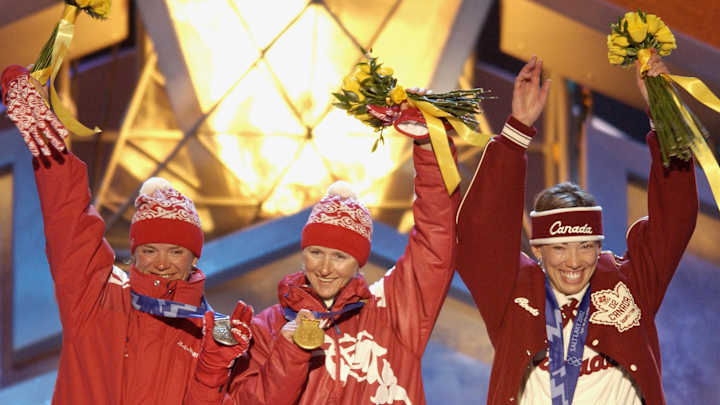Athletes urge WADA to use influence in Russian Olympic case

MONTREAL (AP) Together, Russia and Kenya won 27 medals at the last Olympics in track and field. Their total at the next one could be zero.
The Olympic hopes of the powerhouse teams from both countries took serious blows Thursday after the World Anti-Doping Agency delivered stinging rebukes to attempts to clean up their drug-addled programs.
The WADA foundation board suspended Kenya's anti-doping agency after determining a new law passed there to combat doping was ''a complete mess.'' The agency also released new numbers out of Russia showing that testing by independent authorities has decreased by more than two-thirds in the past year.
''Disappointing and disturbing information,'' said Beckie Scott, the Canadian gold-medal cross country skier who chairs WADA's athlete committee.
At the London Olympics, Russia won 16 medals and Kenya won 11. At world championships last year, the Kenyans tied Jamaica for the most gold medals, with seven.
Among those whose participation in Rio is in jeopardy include 800-meter world-record holder David Rudisha and both the men's and women's winners of last month's London Marathon, Eliud Kipchoge and Jemima Sumgong. Russia has a stable of champion race-walkers and champions in field events, including world-record pole vaulter Yelena Isinbayeva.
The final call on whether either country's track team will be eligible for the Rio de Janeiro Olympics is left to the sport's governing body, the IAAF, which is set to decide about Russia at a meeting on June 17. IAAF also has jurisdiction over the Kenyan track team, and while it's not unthinkable a team could compete without its country's anti-doping agency intact, WADA's move certainly raises the bar.
''If it's a sports federation, you wouldn't run your world championships in an unaccredited country, you wouldn't hold conferences there and that kind of thing,'' said WADA president Craig Reedie. ''But the world of sport and the world of government doesn't confer on me the power to decide those kind of questions.''
Maybe they should.
There were calls at the meeting, most notably from Scott, for WADA to provide more rock-solid assurances that the countries would not participate in Rio.
''I'm discouraged,'' Scott said. ''I think this is just appalling what's happened. We're at the forefront of it, and it's taken the media to expose it. It's sad but I hope it's going to change.''
The problems in Kenya run well outside the country's borders. Since the London Games, 40 Kenyans have been banned, all but five of them caught outside their home country. The Associated Press reported that because of difficulty processing samples, some athletes are given advance notice of their tests, which makes it easier to escape detection.
A law passed last month in Kenya sought to resolve the issues, and legislators thought it had WADA's blessing. But amendments made to the original bill rendered the law unsatisfactory, leading the board to reject Kenya's agency.
''A complete mess,'' said Olivier Niggli, who will take over as WADA's director general in July.
Could the legislature pass the correct law in time to bring the anti-doping agency in compliance before the Olympics?
''Where there's a will, there's a way,'' Niggli said.
Reaction in Kenya ranged from outraged to confused.
''We don't know the way forward,'' said Julius Yego, the world champion in javelin. ''Should we continue training or do we stop?''
Kenyan marathoner Wesley Korir, who serves in the country's parliament, said WADA is ''killing the sport. Are we making the laws for WADA or for Kenyans?''
Russia's situation appears more dire.
This week has been filled with nonstop revelations, none reflecting well on the country that hosted the 2014 Sochi Olympics, which now look every bit as tainted as the track team.
On Sunday, there were whistleblower Vitaly Stepanov's details about four gold medalists from the Sochi Games who used steroids.
On Thursday, as the WADA meeting was in progress, the New York Times went live with a blow-by-blow breakdown of how Russians switched out urine samples and performed other deceitful acts to ensure 15 drug-using medal winners and many others wouldn't test positive.
And WADA released its own figures about drug testing in Russia since its anti-doping agency was suspended last November:
-Only 10 doping-control agents are available to conduct tests throughout the entire country, and private contractors are reluctant to sign deals with Britain's anti-doping agency, which is in charge of the reforms in Russia, because the country's government doesn't pay on time.
-Agents are often harassed when trying to enter ''closed'' cities in Russia with increased military presence, told if they show up again, they'll have their visas revoked.
-Of the 247 tests overseen by UK Anti-Doping, there have been 99 failures due to the inability to locate an athlete.
-From Nov. 18 through May 5, there had been a total of 2,244 tests conducted on Russian athletes, compared to 6,890 over the same period a year earlier, when the Russian agency was still controlling the tests.
''I don't want to totally discount the quality of the testing that is occurring now,'' said Joseph de Pencier, the CEO of the Institute of National Anti-Doping Organizations. ''But clearly there's a problem with those numbers.''
Throughout the meeting, there were calls for increased funding for WADA and for a beefed-up investigative arm that would allow the agency to pursue evidence of cheating instead of waiting for the media and others to uncover it.
All in the works, Reedie promised.
But the Olympics are less than three months away, and Scott may have best framed the bottom-line concern.
''The anti-doping movement requires athletes to believe it's working,'' she said. ''If we don't lead investigations, and not just follow up on TV programs - if we don't sanction (athletes and countries), then we lose belief not only in the system, but in the idea that winning clean is possible.''
